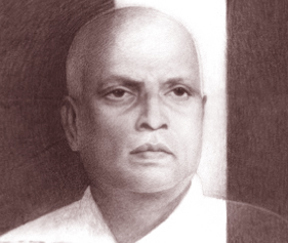 The attribution of reality to things which rise in thoughts is the cause of all bondage. Form can exist only as the object of seeing and never independently of it. This rule applies to all sense-objects.
The attribution of reality to things which rise in thoughts is the cause of all bondage. Form can exist only as the object of seeing and never independently of it. This rule applies to all sense-objects.
Objects have themselves no connection to each other – their connection is always with thought alone. An object cannot exist even for a moment unless cognized by thought. When thought changes, the object changes also. Thus they are inseparable and therefore, one.
The truth, which is One thing, is kept divided by mere words.
Therefore, even to hold that a thing rises in thought is mere delusion. There is thought only and the content of thought is Consciousness.
If this truth is always kept alive, thought will soon vanish and Consciousness will reign. Then comes liberation from all bondage.
Two aspects of Consciousness
Samvit (Consciousness) has two aspects: conditioned and unconditioned. It is the former that illumines objects of Consciousness.
The latter is Pure Consciousness. Sense-objects such as sound, touch, smell, etc., are mere thought-forms. Therefore, correctly speaking, thoughts alone are the objects of Consciousness.
He, who by careful analysis and discrimination is unable to reach the unconditioned aspect, may well abide in the conditioned. He will reach the unconditioned in due course if he does not remain contented in the conditioned.
Observing carefully, one can see every thought arise and set in pure Consciousness alone. What is not Consciousness is all thought-form. Pure Consciousness can never bear witness to it.
It is no argument to say that memory – itself a thought form – stands changeless, watching all thoughts in succession. It is a common experience that when there are other thoughts, memory is not there with them.
How then can memory call up past thoughts? If memory cannot do it, it is no memory at all. Memory is therefore a meaningless word.
It cannot but be admitted that it is always memory that calls up past thoughts. If what we call memory is non-existent it follows that thoughts are also nonexistent. There is no witness to prove their existence.
If memory is non-existent, it follows that other thoughts are non-existent also, there being no witness to prove their existence.
Therefore it can be clearly understood that what appeared to be conditioned is also pure unconditioned Consciousness.
The Seer and the Seen
If one looks through the gross organ eye, gross forms alone appear. The same relation exists between other gross organs and their objects. Leaving the physical organs, if one looks through the subtle sense organ called mind, subtle forms appear. Looking through the attributeless pure Consciousness, one sees Consciousness only and nothing else.
This experience proves that the objective world will always appear in perfect tune with the stand taken up by the subject.
Therefore, it is not the objective world which presents obstacles to one’s spiritual progress, but the false stand one has taken up.
If this is given up, spiritual enlightenment follows. To give up the stand, courage and one-pointed attention and heart’s devotion are absolutely necessary.
A critical examination of the objective world will bring about the same result. To arrive at the conclusion that this solid-seeming world is a mere thought does not solve the whole problem. It cannot give entire satisfaction; for the thought-world remains.
The examination did not give satisfaction because it was conducted from the level of the buddhi (intellect) which was left unexplained.
Buddhi is also something perceived. Is not oneself (Consciousness), the real Perceiver? To examine thoughts one has to take one’s stand in perceiving Consciousness.
When it is seen that the content of thought is nothing but Consciousness, thought vanishes and Consciousness remains.
Consciousness, when mistakenly supposed to be conditioned by time, appears as thought. Really, it is not so conditioned.
Excerpted from Atma Darshan. The 130th birth anniversary of Atmananda Krishna Menon will be observed on December 8.
Atmananda Krishna Menon






